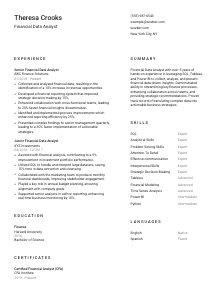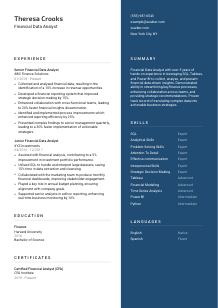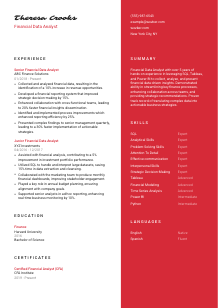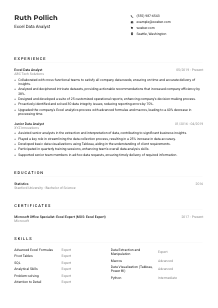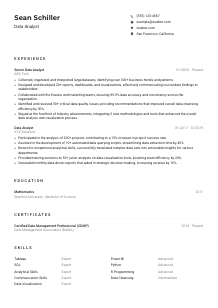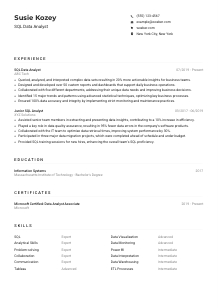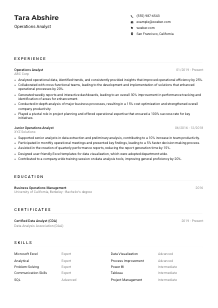Financial Data Analyst CV Example
Decoding market trends, but your CV isn't adding up? Dive into this Financial Data Analyst CV example, crafted using Wozber free CV builder. See how effortlessly you can blend your analytical expertise with job specifics, and position your career graph to impress both investors and hiring managers!
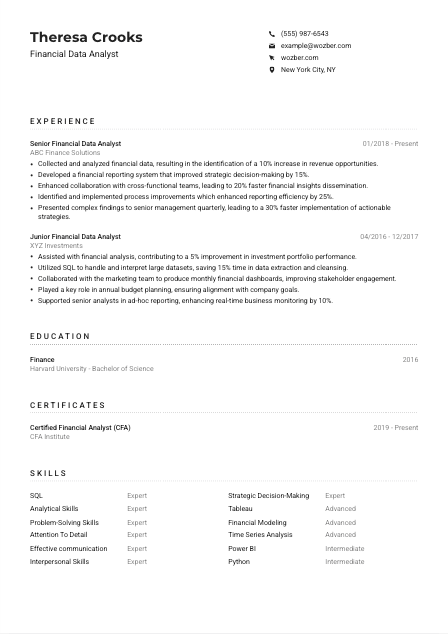
How to write a Financial Data Analyst CV?
Hello, aspiring Financial Data Analyst! Let's face it, diving into the finance world with a CV that sets you apart is more than a nice-to-have; it's your ticket to the inner circle of your dream career. Today, I'm here to guide you step by step on creating a CV that's not just a piece of paper but a beacon of your expertise and capabilities, tailored just for a Financial Data Analyst position.
By employing the Wozber free CV builder, let's embark on a journey to sculpt a CV that speaks volumes to hiring managers, blending your analytical finesse with the role's specific demands.
Personal Details
Kicking things off, personal details might seem like the straightforward part, but it's your first handshake with prospective employers. Let's ensure this handshake is firm, confident, and aligned with what a Financial Data Analyst needs to convey.
1. Make Your Name Shine
Your name? That's your personal brand. Amplify it with a clear, standout font. Imagining your name in bold, slightly larger than the rest sets the stage. It's not just typography; it's the first declaration of your personal brand.
2. Tailor Your Tagline
Just below your name, wear your intended role like a badge of honor. For a Financial Data Analyst, integrating this title immediately positions you as a fitting candidate, resonating with the hiring manager's search criteria.
3. Essential Contact Avenues
Keep it straightforward yet encompassing with your phone number and a professional email. A typo can mean a missed opportunity, so double-check for accuracy. Remember, firstname.lastname@email.com leaves an imprint of professionalism.
4. Localize Yourself
"New York City, NY" isn't just a location; it's a keyword that aligns you with the job's geographical requirements. Stating your location upfront confirms to your prospective employer that you are ready and within reach.
5. Professional Platforms
If you have a LinkedIn profile or a professional website that showcases your portfolio or professional journey, include it. A well-maintained LinkedIn profile acts as a dynamic extension of your CV.
Takeaway
Crafting your Personal Details is akin to laying down the welcome mat. It's your first impression, simultaneously professional and personal. Ensure these details sing in harmony, setting a confident opening note for your Financial Data Analyst CV.





Experience
The Experience section is where you get to narrate your professional journey. For a Financial Data Analyst, highlighting experiences that resonate with the job's requirements is critical. Let's decode this together, transforming your experiences into compelling stories of your professional prowess.
- Collected and analyzed financial data, resulting in the identification of a 10% increase in revenue opportunities.
- Developed a financial reporting system that improved strategic decision‑making by 15%.
- Enhanced collaboration with cross‑functional teams, leading to 20% faster financial insights dissemination.
- Identified and implemented process improvements which enhanced reporting efficiency by 25%.
- Presented complex findings to senior management quarterly, leading to a 30% faster implementation of actionable strategies.
- Assisted with financial analysis, contributing to a 5% improvement in investment portfolio performance.
- Utilized SQL to handle and interpret large datasets, saving 15% time in data extraction and cleansing.
- Collaborated with the marketing team to produce monthly financial dashboards, improving stakeholder engagement.
- Played a key role in annual budget planning, ensuring alignment with company goals.
- Supported senior analysts in ad‑hoc reporting, enhancing real‑time business monitoring by 10%.
1. Decode and Match
Every job requirement is a clue. For the Financial Data Analyst role, dissect the given job description and align your experiences with skills like SQL proficiency, financial forecasting, and cross-functional collaboration.
2. Present with Precision
Layout your journey, beginning with the most recent role. Detail your titles, the names of companies, and the tenure. Remember, clarity is key.
3. Craft Achievement Bullets
Under each role, bullet accomplishments that mirror the job listing. For instance, "Developed a financial reporting system that improved strategic decision-making by 15%" directly corresponds with the responsibilities of a Financial Data Analyst.
4. Quantify Success
Numbers don't lie. They paint a picture of your impact. Whenever possible, quantify your contributions, like the revenue increase or efficiency improvements you've spearheaded.
5. Relevance is King
Stick to what matters for the Financial Data Analyst role. While it might be tempting to list every achievement, focus on those that showcase your analytical prowess and financial acumen.
Takeaway
Think of your Experience section as your professional narrative. Each bullet is a plot point that builds up to the ideal candidate for the Financial Data Analyst role. Tailor your story with precision and purpose, making it impossible for hiring managers to overlook.
Education
In the realm of Financial Data Analysis, your education isn't just a formality but the bedrock of your analytical prowess. Here's how to ensure your educational background is not just listed but showcased to highlight your fit for the role.
1. Connect the Dots
Directly link your degree to the job's requirements. In this case, a "Bachelor of Science in Finance" is what the job description calls for. Make sure this tidbit is clearly reflected.
2. Structure It Right
A clean, easy-to-follow structure helps. List your degree, your field, the institution's name, followed by the graduation year. Simplicity makes it easy for hiring managers to scan.
3. Degree Detailing
If the job highlights a field-specific requirement, showcase it. For instance, possessing a degree in Finance directly aligns with the needs of a Financial Data Analyst.
4. Coursework Counts
Especially important for fresh graduates or those at early career stages, listing relevant courses or projects can bolster your CV. While not necessary for seasoned professionals, it can be a bonus for newer entrants.
5. Supplementary Successes
If applicable, don't hesitate to mention honors, relevant extracurriculars, or projects. For senior roles, this might be less relevant, but it can highlight your dedication and passion early in your career.
Takeaway
Your educational section is a narrative of your intellectual journey, tailored to spotlight how it molds you into the ideal Financial Data Analyst. Make every word in this section count, constructing a strong academic foundation for your CV.
Certificates
Certificates can significantly bolster the credibility of a Financial Data Analyst, demonstrating continued professional growth and expertise. Let's navigate through positioning your certificates to complement your professional narrative effectively.
1. Relevance is Key
Prioritize showcasing certificates that resonate directly with the Financial Data Analyst role. For instance, if you have a Certified Financial Analyst (CFA) certificate, it immediately elevates your profile.
2. Elegance in Listing
Present your certificates with precision. If relevant to the position, noting the issuance date or the validity period can provide context and convey your commitment to staying updated in your field.
3. Date Details
If recent, highlighting the acquisition date of a certificate can underscore your drive for continuous learning and staying abreast of industry standards.
4. Continuous Improvement
The finance realm is ever-evolving. Showcasing ongoing education through certifications tells hiring managers that you're committed to your professional development, always aiming to be at the forefront of industry trends.
Takeaway
Certificates are your arsenal, solidifying your expertise and dedication in the financial analysis field. Strategically select and present your certifications to complement your narrative and showcase your ongoing commitment to professional excellence.
Skills
The Skills section of your CV is a compact display of your proficiency arsenal. For a Financial Data Analyst, aligning this arsenal with the role's demands is critical. Let's sharpen and tailor your skills section to ensure you're seen as the perfect fit.
1. Skills Dissection
Isolate skills directly from the job description - SQL expertise, Tableau, Power BI experience, analytical ability, and problem-solving prowess are non-negotiables for a Financial Data Analyst.
2. Skills Symphony
List both hard and soft skills that resonate with the Financial Data Analyst role. Being proficient in SQL and possessing strong analytical capabilities should be complemented with effective communication and attention to detail.
3. Precision & Focus
Resist the temptation to overpopulate this section. Keep it sleek and focused. Highlighting your strongest, most relevant skills makes for a compelling read and signals your perfect fit for the role.
Takeaway
View your Skills section as a curated showcase of what makes you an invaluable asset as a Financial Data Analyst. With each skill meticulously chosen for its relevance and impact, you're not just a candidate; you're the candidate.
Languages
In a global finance market, the power of language cannot be underestimated. For a Financial Data Analyst, showcasing linguistic abilities might just tip the scales in your favor. Let's explore how to make your linguistic skills a compelling part of your CV narrative.
1. Job Requirements Sync
First things first, align with the job's language requirements. Our example mentioned "Command of the English language is essential," making it imperative to highlight your proficiency levels in English convincingly.
2. Prioritize and List
Start with the languages critical for the role, detailing your proficiency. If the Financial Data Analyst role involves global markets, your language skills become an invaluable asset.
3. Showcase Additional Languages
Even if not specified, additional language proficiencies illustrate your versatility and global readiness - traits that can be appealing in a Financial Data Analyst positioned in a global city like New York.
4. Clarity in Proficiency
Be crystal clear about your command over each language listed. From 'native' to 'basic,' your honesty in self-assessment can speak volumes about your integrity.
5. The Bigger Picture
In roles interfacing with diverse demographics or international markets, your multilingual abilities not only add value but can be a unique selling point. Consider your language skills as part of your professional toolkit.
Takeaway
Leverage your linguistic skills as bridges to opportunities, painting a picture of a global finance professional. Whether your proficiency is 'basic' or 'native,' each language you speak adds a layer to your professional persona, making you a more versatile and attractive candidate.
Summary
The Professional Summary is where you grab attention with your unique story. For a Financial Data Analyst, it's an opportunity to highlight how your expertise intersects with the role's needs. Let's craft a summary that's both captivating and strategically aligned.
1. Capture the Job Essence
Kick off by understanding the core of the Financial Data Analyst role. Digesting the job requirements is your first step in tailoring a summary that speaks directly to the needs and expectations.
2. Commence with Confidence
Begin with a powerful introduction of yourself as a professional. Mention your years of experience and your specialty in leveraging tools like SQL, Tableau, and Power BI for financial data analysis.
3. Address With Precision
Pinpoint and list the key skills and achievements most relevant to the role. For example, showcasing your ability to transform complex data into actionable insights signifies your capability to navigate the responsibilities of a Financial Data Analyst effectively.
4. Brevity is Brilliance
Keep your summary concise yet impactful. Aim for 3-5 lines that potentiate your suitability for the role, sparking interest and inviting the reader to delve deeper into your CV.
Takeaway
Your Professional Summary is your handshake, your first impression, your elevator pitch. It's where you marry your experience and skills with the role's demands, setting the tone for the rest of your CV. Keep it crisp, tailored, and engaging. Let this be the opening line of a success story that lands you the Financial Data Analyst role of your dreams.
Launching Your Financial Data Analyst Journey
Congratulations on fine-tuning your Financial Data Analyst CV! With these insights and the help of Wozber's free CV builder, including ATS-friendly CV templates and an ATS CV scanner for optimisation, you're set to impress hiring managers. Remember, your CV is not just a document; it's a narrative of your professional excellence. Tailor it, infuse it with your personal brand, and let it be the launchpad for your next big opportunity.
The finance world is waiting for your impact. Go forth, analyze, and conquer!

- Bachelor's degree in Finance, Economics, Mathematics, or a related field.
- Minimum of 3 years' experience in financial analysis or data analytics.
- Proficiency in SQL and the ability to work with large datasets;
- experience with data visualization tools such as Tableau or Power BI.
- Strong analytical and problem-solving skills with a high attention to detail.
- Effective communication and interpersonal skills to collaborate with cross-functional teams.
- Command of the English language is essential.
- Candidate must be located in or willing to relocate to New York City, NY.
- Collect and analyze financial data to monitor trends and forecast business results.
- Develop and maintain financial reporting systems to support strategic decision-making.
- Collaborate with Finance, Operations, and Business Development teams to provide timely and accurate financial insights.
- Identify and implement process improvements to enhance the efficiency and effectiveness of financial reporting and analysis.
- Present findings to senior management and other stakeholders, translating complex data into actionable insights.





